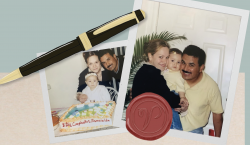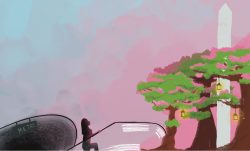We stood at the Sarajevo bus depot, Mike and I, squinting into the sunlight that filtered down past the snowy hills through the tissue of smog that wrapped the city like a package. We were pretty pleased with ourselves for having gotten the Bosnia entry stamp in our passports, but we weren’t really certain what to do next. Standing on the asphalt outside of the bus station, we were disoriented and alone. Everywhere we had been, we were greeted with a small mob of elderly women pensioners looking for tourists to rent rooms to for a few days. But getting off the bus in Sarajevo, we had been greeted by exactly one woman looking to rent us a soba, and she had disappeared ten minutes before to find a friend of hers who spoke English. Behind the smog, the sun was on its way back down.
Then a short, boxy woman with ferocious red hair, huge mod sunglasses and a camelhair coat walked up and asked us whether we needed a place to stay. “Mama Taiba,” she said with mock modesty, placing her palm on her breast. “Soba?” Following the easiest option at any given moment had worked well for us, so we gave the foreigner’s assent (nod your head and say “da” about eight times as you relish the fact that you’re communicating something comprehensible) and were quickly ushered into a waiting taxi by a driver who treated our hostess as royalty.
Crossing the city’s wide, streetcar-tracked boulevard, the sunlight dappling our eyes as it shined through the gaping skeletons of semi-destroyed apartment blocks, she began her short history of the war. “Serbi, bombe,” she said, pointing to the collapsing stacks of concrete slabs, pinching her fingers together and daintily plucking little bombs from the air, one by one. “Peechoo, peechoo,” she said, turning in her seat as she picked out each burnt-out building.
The cab dropped us outside an apartment block distinguishable from those around it by the crew of construction workers banging, screwing and chipping away at its fa?ade. Four neat squares of varying shades of blue paint had been applied to the concrete of a first-floor balcony, and two men with stacks of paint samples were standing back from the building, deep in discussion. We ducked underneath the scaffolding and climbed the dusty steps to the second floor, making approving noises when Mama Taiba pointed out the faux-marble floor, the newly installed electrical box. Standing outside her door marked with an immaculate cursive plaque that read “Hadziahmetovic Taiba,” she started the story again while she fumbled for her keys. “Serbi,” she said, grinning right at Mike as she first drew her finger across her throat, then clapsed her hands against her cheek and mimed sleep, then pointed to a huge ring on the fourth finger of her right hand. We made more noises, hopefully less approving but equally understanding.
The d?cor inside was overwhelming after a week of sparse extra bedrooms in whitewashed stucco houses. Rugs covered every inch of floor, hung from the walls, and were draped across several chairs. Glass cabinets held ceramic nicknacks and scores of books. Instead of two single beds, we got a 15-foot-long couch with pillows piled at each end. Just as I wondered how we, with our unwashed hair and three pairs of pants between us, could possibly stay in such an ostentatious apartment, she produced from behind the door two folding lawnchairs, as good a way as any to make two guys from the Midwest feel at home.
Having set our luggage down, we got the grand tour, which quickly culminated in a family photo. “My son, doctor,” she said proudly, pointing at a handsome, bearded man in a suit flanked by two women. “Sister,” she said, indicating the fifty-ish woman to his left. Then she set the photo down and pointed to her right knee, shaking her head and then passing her hands quickly over one another, like an umpire calling it safe. “No! No! No!” she said. “Serbi.” Then her finger shot up in the air, and she turned her head ever so slightly while her eyes bore down on us in anticipation. I leaned in, concerned. “Plastika!” she lit up, doing an awkward shuffle around the room. “No problem.” Lastly, she pointed to the woman on her son’s right. “Me, Mama Taiba,” she said, beating her hand against her breast as her face lit up. We agreed. Her attention turned suddenly to me as her large hand gripped a good half of my face. “Son!” she said. “My son.” Mike nodded.
Next she herded us into the kitchen, where she set about preparing coffee, singing out “Bosnia caf?, no espresso,” as she turned on the electric burners and pulled a long-handled brass Turkish coffee pot down from a shelf. Then she produced two tall, narrow glasses and filled them both to the brim from the tap. In Croatia and Bosnia, a cup of coffee is typically served with a tall glass of cold water, a custom that barely registers on the garish spectrum of American dining habits, but that takes on a real elegance after your senses dilate. As we watched, she placed the glasses of water on a brass tray, then produced a white plastic container. “Vitamine,” she exclaimed, emphasizing the mi-ne as she turned the bottle so we could see where the vitamine were advertised, all nine of them. You can’t really argue with vitamins, so we nodded, and she garnished each glass of water with two heaping spoonfuls of green crystals that looked a lot like fish food. As our water turned lime green, she handed us the glasses. “My sons. Mama! Bosnia caf?, no espresso,” she said, first softly, then with gusto, then again singing lightly as she turned back to the stove. The vitamin water tasted like Tang.
She turned back quickly. “Serbi,” she said, making little “pop” noises and jabbing an imaginary rifle at us before miming sleep, then showing us the ring again. “Uzhasno,” said Mike, hoping his Russian might register with a fellow speaker of a Slavic language. Horrible.
Then she produced two dainty china cups, and took the Bosnia caf? from the burner, where it had been boiling in the brass pot. “Tako!” she exclaimed as she filled the cups, then decorated them using a can of Redi-Whip that she produced from the fridge. We sat and sipped, and every few moments she would top up our cups with whipped cream.
That night, before we headed out into the city, I sat in my lawnchair and looked through the guestbook in our room. Most of the entries were gushy backpacker stuff (“Sarajevo is AMAZING and I’m having the TIME of my LIFE!!), mixed in with advise both practical (“Bosnjak boarding house in Dubvnk has no hot water”) and dubious (“Everything you read about Northern Albania + Kosovo being dangerous is total non-sense!”). More than a few people had decided to use the page to laud their hostess’s hospitality. “Mama Taiba’s smile found us and then off we went to her wonderful and slightly eccentric flat (eccentric like Victorian grandmother, not crazy eccentric).” Dave, from Australia, seemed to sum it up as well as anyone. “My Sarajevo Mama Taiba, beautiful, super, dobro!”
Bill Cleveland is a junior in the School of Foreign Service and editor-in-chief of the Georgetown Voice. Spring break ‘04? Baghdad, baby.




